Shopify vs. WordPress: Which should you use?
These are two of the largest and most popular website solutions in the world. And each of them offers an abundance of features and tools to help you build and manage a website. But that's kinda the problem: when trying to decide between them, where do you even start?
If that's not confusing enough, Shopify and WordPress have very different approaches: one is a closed source hosted platform, and the other is an open-source self-hosted platform. As a result, how they operate is fundamentally different.
So, it's vital that you choose the right solution for your needs — especially as virtually every aspect of your online business will be affected by your choice.
No pressure then…!
That's why we've created this simple guide. In it, you'll learn about the differences between Shopify and WordPress so you can choose the best platform for your needs. Specifically, we'll compare Shopify vs. WordPress in 10 categories:
- Overview
- Set up and ease of use
- Ecommerce
- Payment gateways
- Themes and design
- Apps and plugins
- Pricing and value
- Customer support and guidance
- Apps for on-the-go management
- Dropshipping
Let's dive in.
(Disclosure: This website is a part of Shopify inc. media properties. Although we strive to publish objective, accurate, and factual content, this article may contain biased opinions.)
Shopify vs. WordPress: Overview
Before we dive into the nitty-gritty, let's learn about the key differences between Shopify and WordPress.
As mentioned, Shopify is a closed source hosted website builder and ecommerce platform. What does this mean? Well, 'closed source' means that Shopify handles all the coding and maintenance of the platform.
→ Click Here to Launch Your Online Business with Shopify
In other words, you don't need to purchase, download, and host Shopify's software on a server. Instead, it's a software-as-a-service (SaaS) tool that you pay a monthly subscription to access.

WordPress, on the other hand, has 2 core offerings: WordPress.com and WordPress.org.
WordPress.com is a SaaS tool like Shopify. It offers a simple website builder for a monthly fee.

On the other hand, WordPress.org is an open-source, self-hosted software solution. This means the software is free, but you'll need to purchase hosting from a third-party provider. You'll then need to install WordPress and manage it yourself.
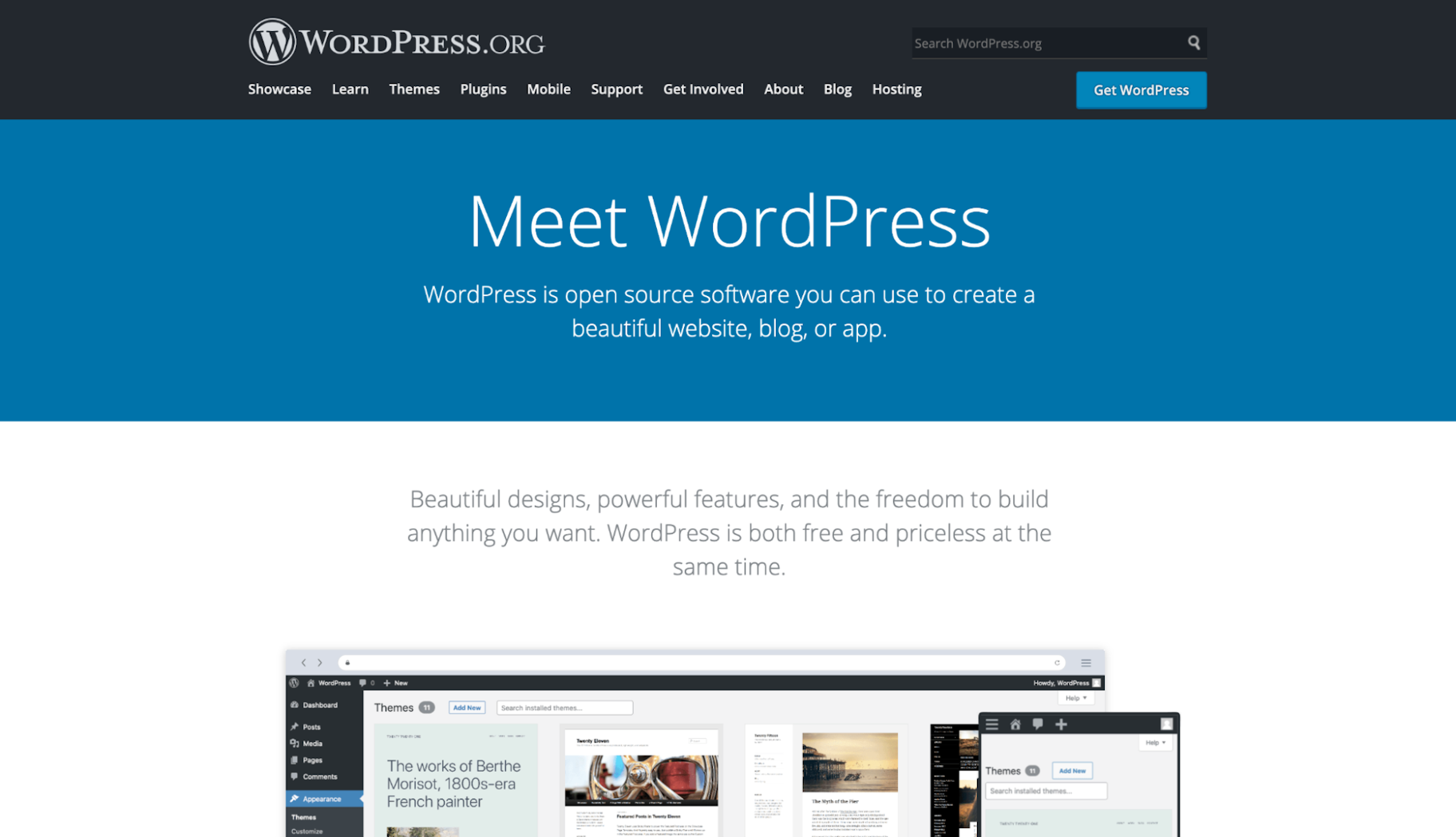
When most people talk about WordPress, they're referring to WordPress.org — the open-source software. So, for this article, we're going to focus on this self-hosted solution.
Now, let's explore what it's like to use these platforms.
Shopify vs. WordPress: Set Up and Ease of Use
To get started with Shopify, simply sign up for the free trial and follow the instructions to create an account. Within a couple of minutes, you'll have a new mission control that you can use to manage your business.
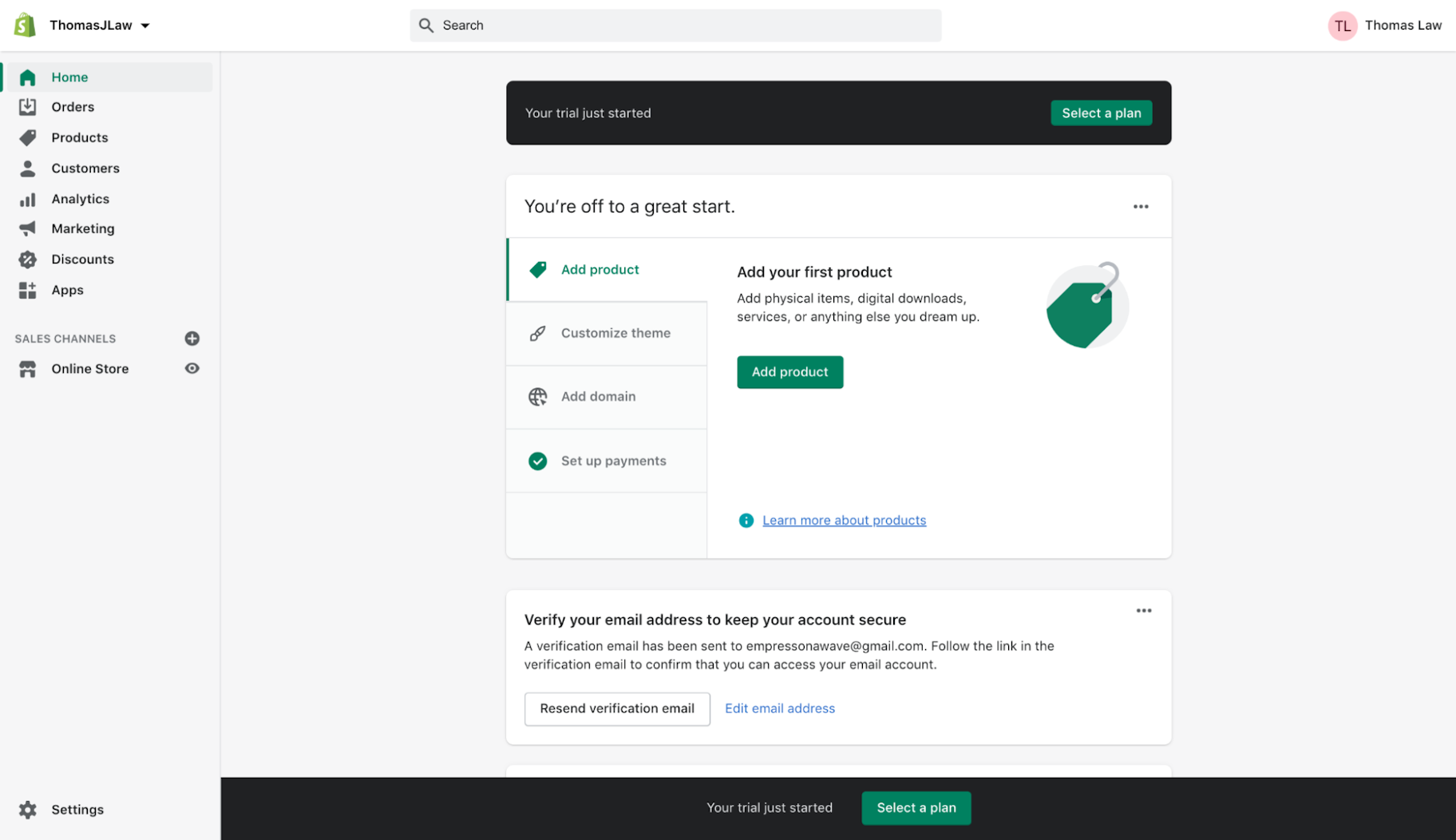
As you can see from the image above, the user interface is intuitive and straightforward. From the get-go, you can start adding products, customize your website's theme, set up payments, and more. You can also purchase a domain name through Shopify to keep things super simple and straightforward.
WordPress is a whole different ball game. First, you'll need to purchase a domain and web hosting from a third-party provider like GoDaddy or SiteGround. You'll then need to install WordPress on your web hosting and set up login details.
Once you log in, things look fairly similar to Shopify's dashboard:
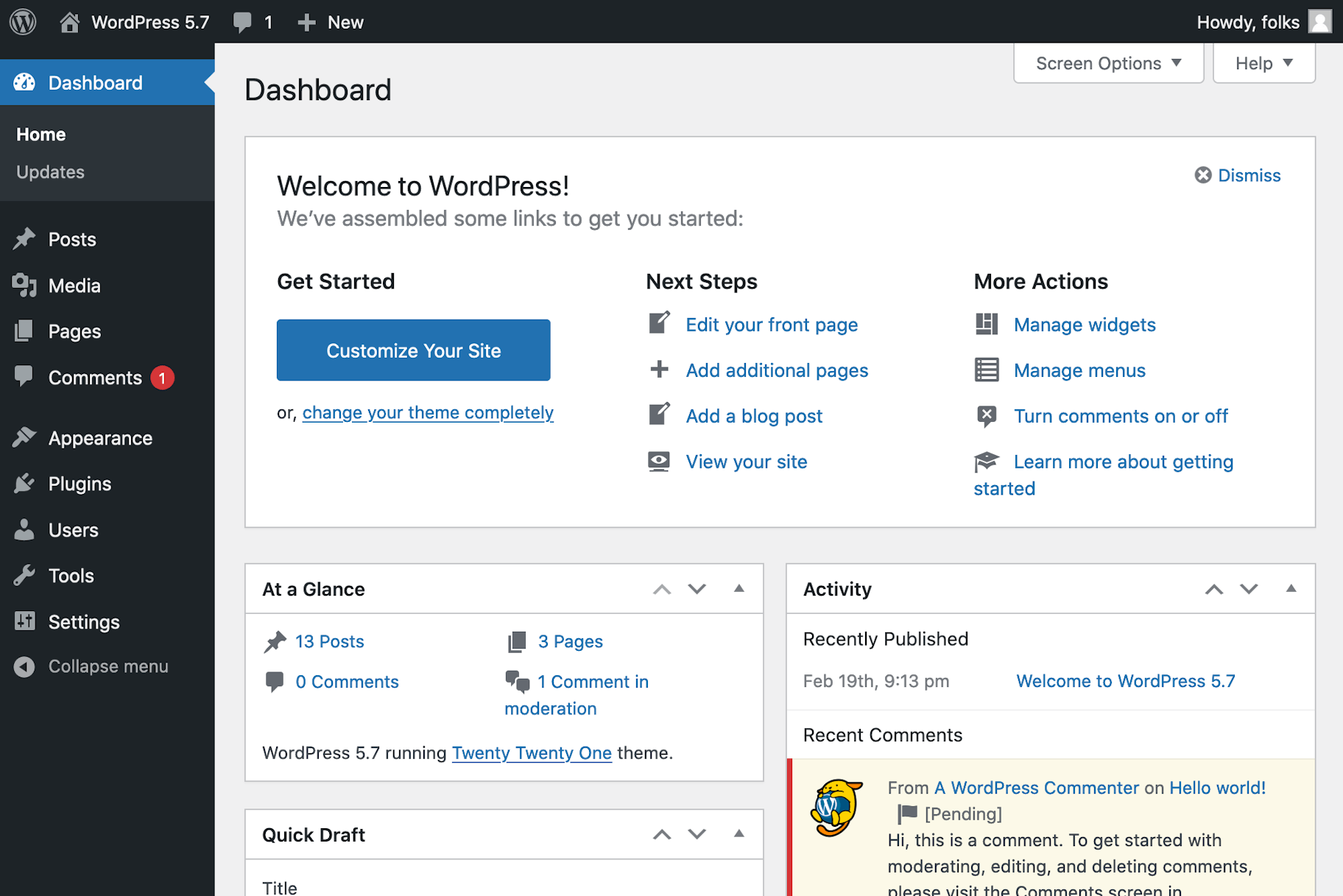
However, Shopify's dashboard comes with many features as standard, such as security, search engine optimization (SEO), and analytics tools. Whereas WordPress is more like a blank canvas that you can use to build whatever type of website you want.
Consequently, you'll need to install third-party plugins for virtually everything, including security, SEO, analytics, and ecommerce.
This brings me to our next point:
Shopify vs. WordPress: Ecommerce
Shopify vs. WordPress for ecommerce — which is better?
For starters, Shopify is entirely dedicated to commerce — I mean, it's in the name, right?
Every aspect of this all-in-one, out-of-the-box commerce solution is geared to providing tools to help businesses grow and prosper. This includes an ecommerce website builder, inventory and order management tools, and integrations with online sales channels, such as Facebook, Instagram, Amazon, and eBay.

Shopify even has its own point-of-sale (POS) solution for businesses that want to unite their online and in-person sales in one simple-to-use dashboard.
Unlike Shopify's out-of-the-box commerce solution, WordPress doesn't come with ecommerce functionality, so you'll need to install and manage an ecommerce plugin. WooCommerce is the most popular WordPress ecommerce plugin.
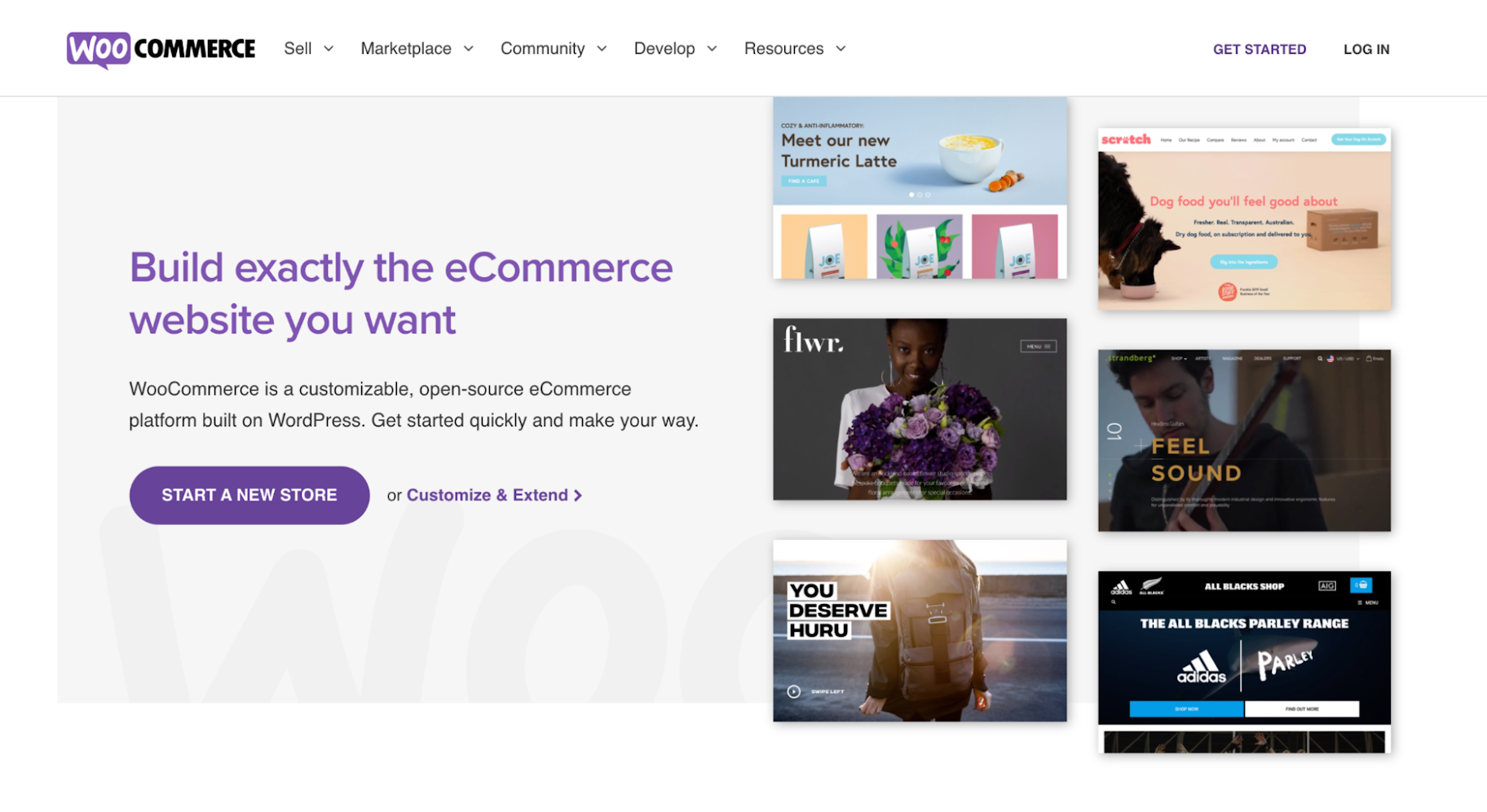
WooCommerce is a highly flexible open-source tool that provides all of the features you need to sell online.
However, like WordPress, WooCommerce's flexibility comes with enormous responsibilities. For example, it doesn't include legal texts, such as general terms and conditions, shipping regulations, or data protection declarations. So, you'll need to install and manage plugins to take care of these things.
Shopify vs. WordPress: Payment Gateways
To sell online, you need a payment gateway to facilitate transactions. Popular payment gateways include Stripe, PayPal, and Amazon Pay.
Shopify integrates seamlessly with over 100 payment gateways. It also has its own gateway called Shopify Payments which makes setting up and managing online payments easy.
To take payments on WordPress, you'll need to set up a payment gateway through your WooCommerce plugin. WooCommerce integrates with more than 75 payment gateways, including its own: WooCommerce Payments.
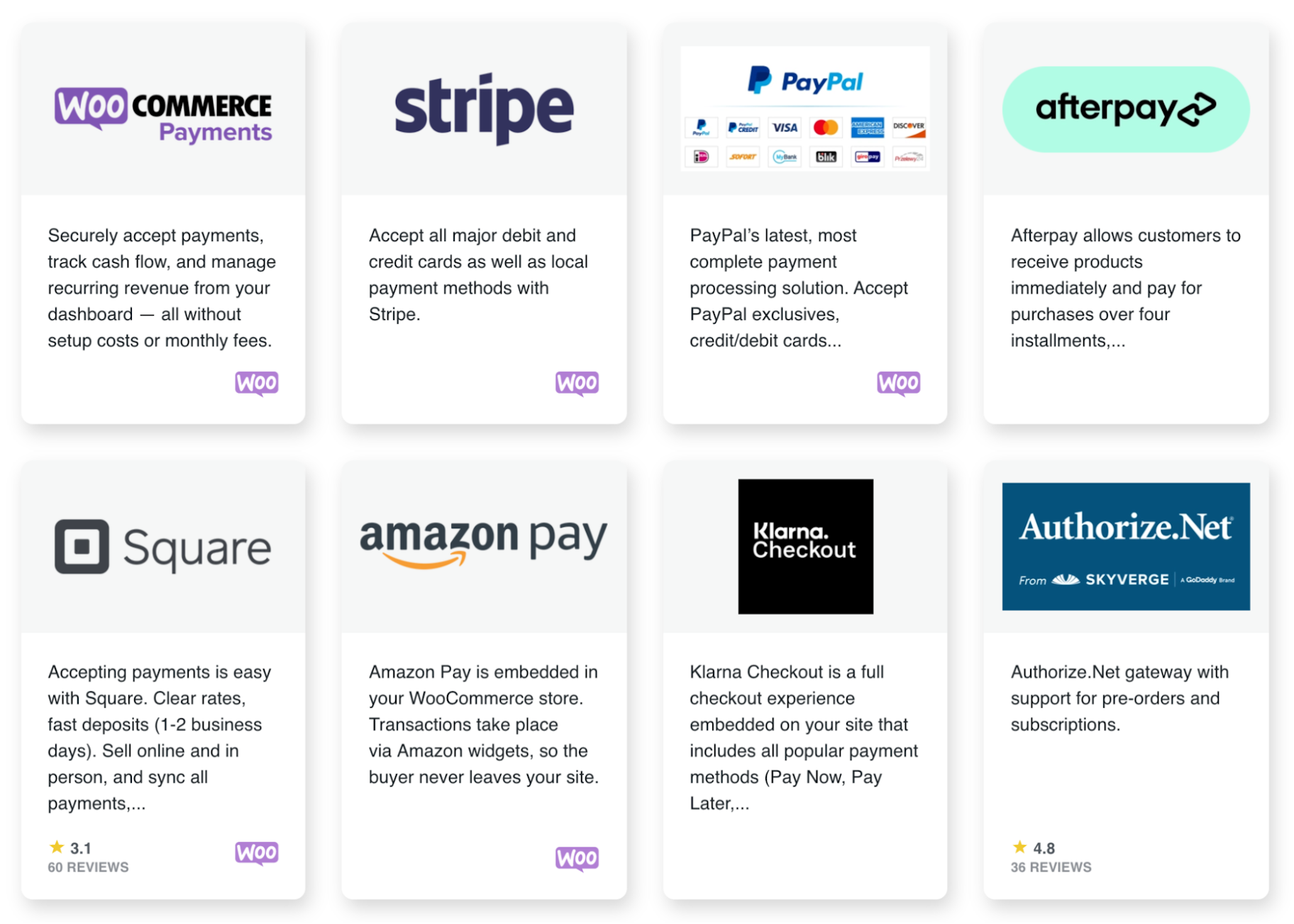
Both platforms provide flexibility here, however, Shopify's all-in-one solution is arguably easier to set up than WooCommerce's offerings.
Shopify vs. WordPress: Themes and Design
Shopify comes with 8 free themes and 64 premium themes that cost between $120 and $180. You can also find 1,200 Shopify themes from third-party developers on Theme Forest.

Shopify’s themes are sales-ready out-of-the-box. These themes are mobile-optimized and responsive, meaning they automatically adapt to the screen they're being viewed on. Plus, Shopify's theme editor is very straightforward and intuitive. So, you don't need any coding or technical knowledge to make it look exactly how you want.
Plus, if you ever get stuck, Shopify's support is on-hand to help 24/7.
WordPress has more than 8,000 themes to choose from — half of which include ecommerce functionality.
WordPress themes typically require a lot of tweaking and editing to get them working the way you want. For this reason, you'll need either some basic coding skills to manage them yourself or the budget to hire a web designer.
It's also worth noting that most of WordPress's themes are made by third-party developers, so if you get stuck, you'll need to reach out to the theme developer for help.

Shopify vs. WordPress: Apps and Plugins
Shopify and WordPress have their own app stores, and users on both platforms rely on third-party apps to build out the functionality they require.
The Shopify App Store features more than 6,000 apps that you can use to improve your website's functionality.
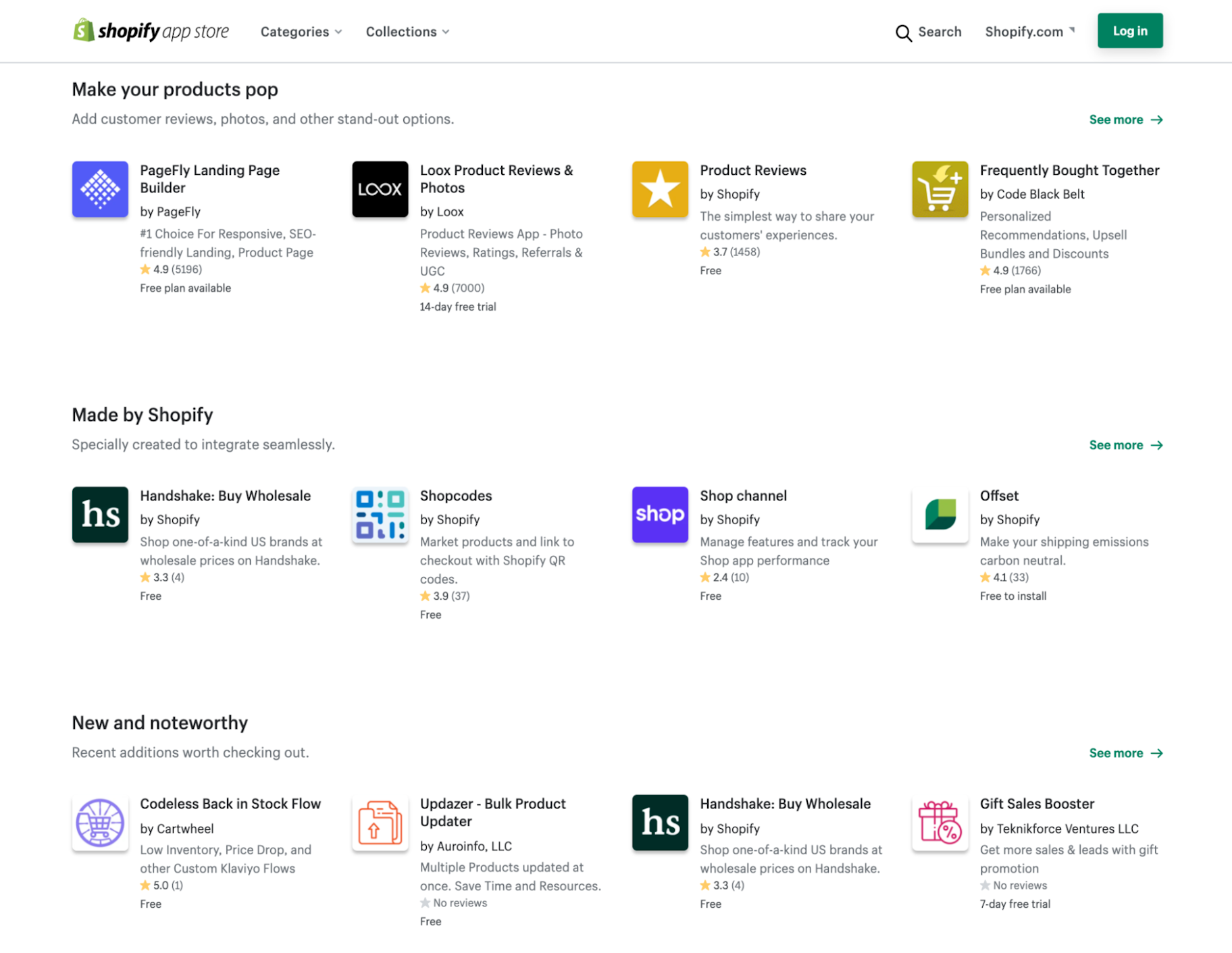
In contrast, there are more than 50,000 WordPress plugins to choose from.
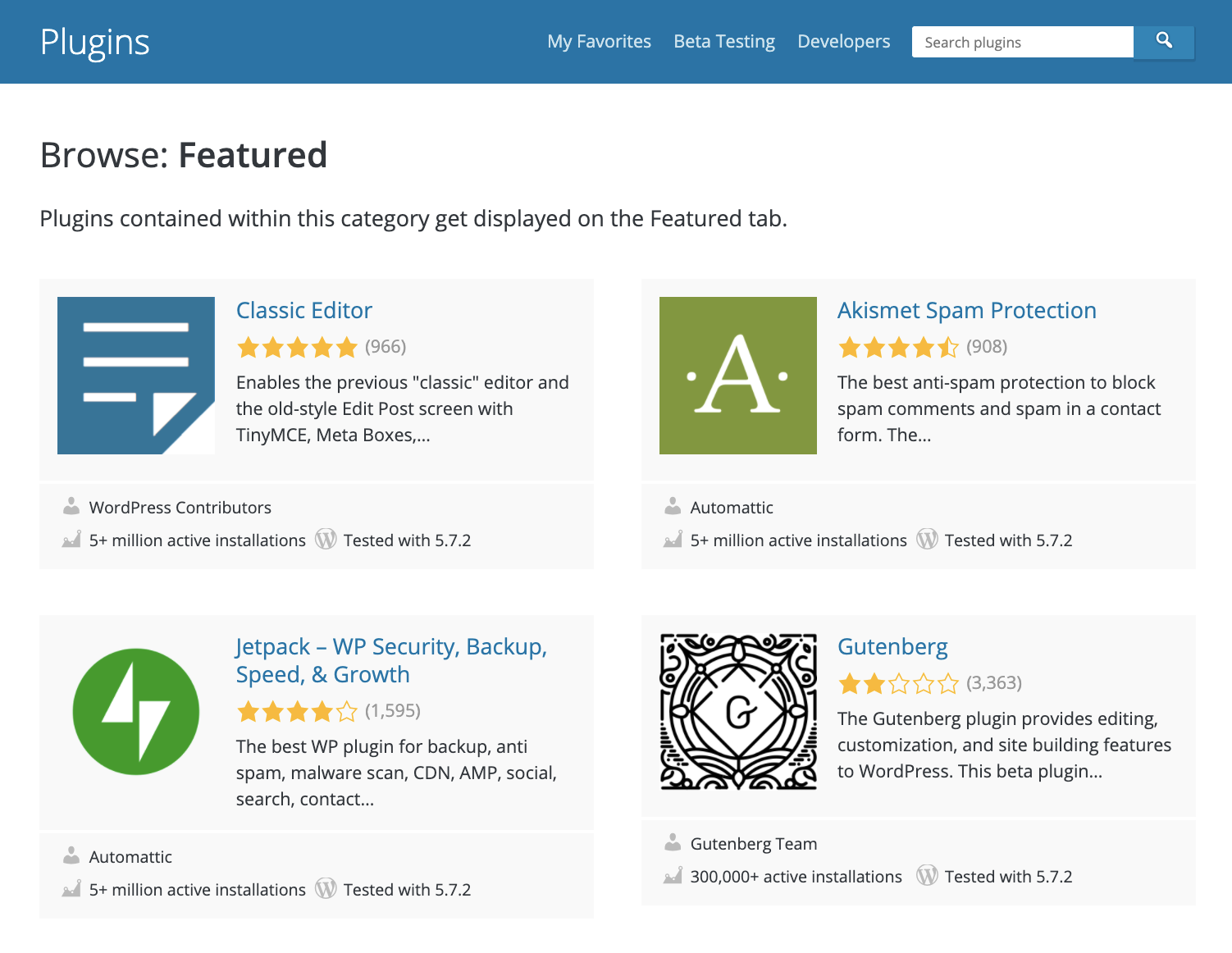
It's fair to say that Shopify users require far less help from third-party apps than WordPress. This is because the platform has built-in ecommerce features and handles all the programming, security, and technical maintenance needed.
WordPress users are more reliant on plugins to get the features they need. And many of these plugins can be difficult to manage if you can't code. Also, some plugins won't work well together and require technical tweaking to get them to play nice together.
Shopify vs. WordPress: Pricing and Value
You're probably wondering which is better value for money: Shopify or WordPress. So, let's explore each platform's pricing.
Shopify's pricing is pretty straightforward. The service has 3 main plans to choose from:
- Basic Shopify: $39/month
- Shopify: $105/month
- Shopify Advanced: $399/month
For new businesses, the Basic Shopify plan provides everything you need to start selling, including an ecommerce website, inventory and order management features, and a POS system.
You can also get a 10% discount if you pay for 1 year upfront and a 20% discount if you pay for 2 years upfront. Plus, Shopify offers a free trial.
So, what about WordPress?
The cost of a WordPress ecommerce website varies dramatically depending on your custom setup. Here are some cost estimates for a typical small business website on WordPress:
- Domain name: $10–$50 per year
- Hosting: $3–$200 per month
- Theme: $0–$200 (According to codeinwp, the average theme costs $59)
- Plugins: $0–$1,000 (Many plugins charge monthly fees, some charge a one-off fee)
- Security: $50–$500 per month
- Developer fees: $0–$1,000 (one-off cost)
Depending on your needs, it's likely that Shopify provides a far cheaper and more streamlined offer.
Shopify vs. WordPress: Customer Support
Ecommerce websites aren't the easiest things to build and manage, so support is essential.
Thankfully, Shopify provides unlimited 24/7 customer support via chat, email, and phone. There's also an extensive help center and active community forums.

As an open-source solution, WordPress doesn't offer support directly. Instead, you'll need to find help on community forums, specialist websites, and YouTube. As a result, unless you're an experienced web developer, you'll likely need to pay for support from a specialist WordPress developer.
That said, you may be able to get direct support for plugin issues from the tool's makers.
Shopify vs. WordPress: Apps for On-The-Go Management
If you need to manage your business on-the-go, Shopify offers 3 apps to help: Shopify, Shopify POS, and Ping.

Shopify's main app allows you to do things like:
- Track and manage orders
- Manage products and collections
- Implement marketing campaigns
- Communicate with customers
- Create discounts
- Track store performance
- Customize your website's theme
- And more
WordPress also has a mobile app that allows you to manage your website's content. And you can use WooCommerce's app to manage your business.

Once you're set up with WordPress and WooCommerce, the 2 apps are comparable to Shopify's main app.
Shopify vs. WordPress: Dropshipping
Dropshipping is the act of selling products online that are stored, packaged, and shipped by a third-party seller — this means you don't need to purchase inventory upfront. The image below shows how it works:
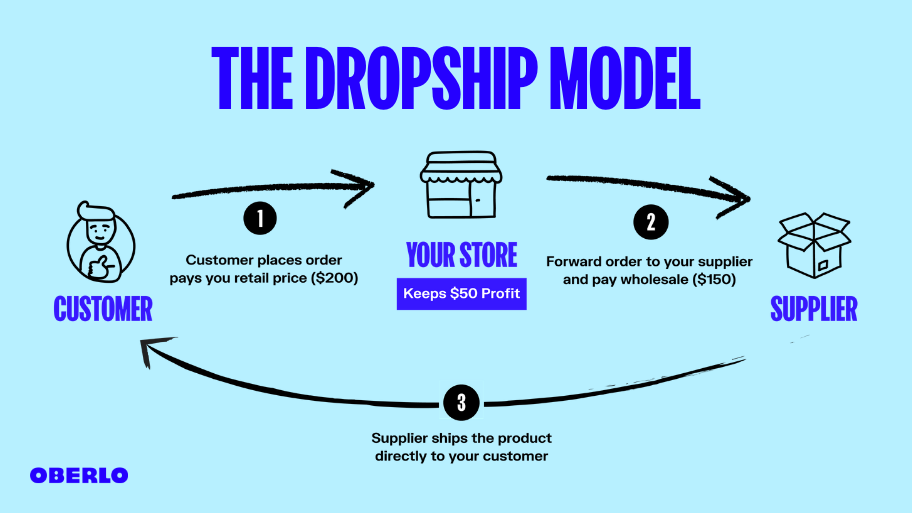
Both Shopify and WordPress provide a host of dropshipping apps like AliExpress Dropshipping and print-on-demand dropshipping apps, such as Printful and Printify.
Final Thoughts: Shopify or WordPress?
Shopify and WordPress are both incredible platforms — but which one should you use for your business?
Here's our verdict: If you want to focus your resources on building and growing a business, use Shopify. This dedicated commerce solution has everything you need to start and scale a business out-of-the-box.
Plus, you won't have to spend valuable time and energy managing hosting, security, and essential ecommerce integrations. You can simply focus on your business and let Shopify take care of the technical side of things. What's more, if you ever get stuck, help is on hand 24/7.
That said, if you're an experienced web developer who wants complete control over every aspect of your website, opt for WordPress and the WooCommerce plugin.
Although you'll be responsible for every aspect of your site's hosting, maintenance, and security, you'll also be able to tweak and optimize everything to your heart's content.
Which platform are you leaning toward? Let us know your thoughts and questions in the comments below!



